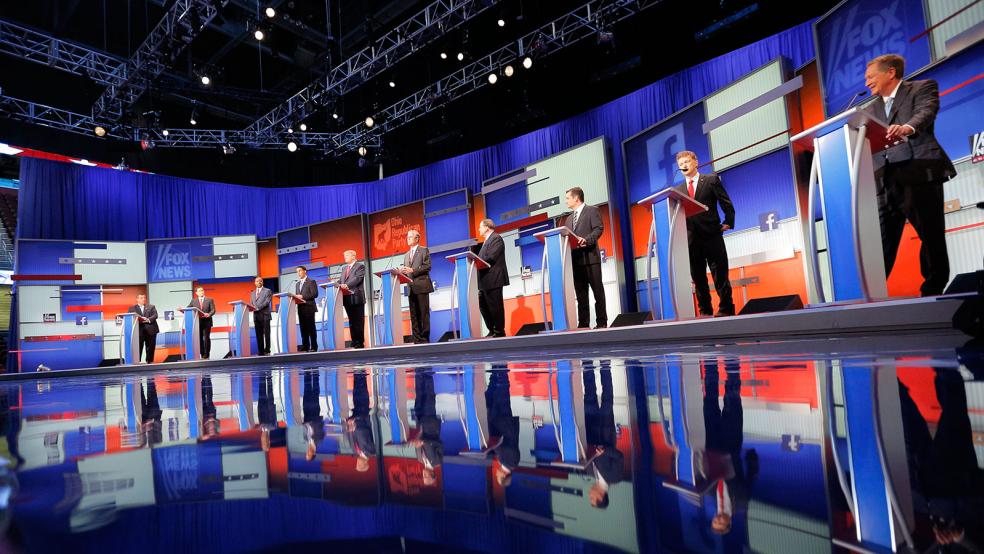With the Republican presidential campaign continuing to tighten between billionaire Donald Trump and former neurosurgeon Ben Carson, the second nationally televised GOP debate Wednesday night is assuming added importance in the winnowing process as 16 candidates vie for the nomination.
Will the brash Trump continue to defy political convention, belittling his competitors and promoting an agenda of harsh anti-illegal immigrant action, tough talk about ISIS and tax increases on the wealthy? Will Carson and others in the crowded field find ways to slow his march to the nomination next summer? A New York Times/CBS News poll released Tuesday suggested that Carson, with his more subdued message to conservatives and evangelical Christians, is rapidly closing in on Trump, 23 percent to 27 percent.
Related: The Trump Insult-athon’s Latest Target: Ben Carson
“I think it will be highly entertaining but baffling,” Ross Baker, a Rutgers University political professor, said of the debate. “You’ve got a dead heat between a loudmouth and an introvert. It’s kind of hard to imagine.… The middle is eliminated and the extremes are represented.”
Trump and Carson have been riding the crest of voter disenchantment with establishment politicians, which will force many of the senators and former governors to find ways to present themselves as political iconoclasts or outsiders – not an easy task. Carson over the past several months has gained on more traditional political figures, including former Florida governor Jeb Bush, who dropped in the New York Times/CBS poll to 6 percent from 13 percent, and Gov. Scott Walker of Wisconsin, who dropped to just 2 percent from 10 percent.
While Trump and Carson are certain to headline the debate televised by CNN from the Ronald Reagan Library in Simi Valley, Calif., former Hewlett-Packard CEO Carly Fiorina will likely be a thorn in Trump’s side throughout the evening, in retaliation for his comments to Rolling Stone that she lacks “the face” to be elected president.
Fiorina used the Fox News undercard debate on August 6, affectionately dubbed the “happy hour debate” by its participants, to catapult herself to the main stage on Wednesday. While Fiorina has moved up slightly in the polls and begun to attract money and bigger audiences, GOP strategists warn not to expect lightning to strike twice, even though the four candidates appearing in the earlier time slot tonight will have more time on air than their cash-strapped campaigns could ever hope to buy.
Related: GOP Presidential Campaign Rapidly Turning into a Two-Man Race
“They pretty much need an act of God to move up,” said Republican strategist Ford O’Connell, noting that all four are “career politicians” in a year where polls show GOP voters prefer candidates without government experience.
“But then again there’s nothing that’s been logical about this process so far,” added O’Connell, who worked for the McCain-Palin GOP campaign in 2008.
Like almost everything since the first Republican debate of the season, Wednesday night will be all about Trump and how he handles the expected salvo of attacks from Carson and the nine other White House hopefuls on stage.
"I hear they are going after me. Whatever. Whatever,” the GOP frontrunner said Monday night at a packed rally in Dallas.
Related: The 2016 Presidential Primary Carnival Rages On
The first GOP debates in Cleveland kicked off the winnowing process after former Texas governor Rick Perry faltered in the preliminary matchup of second-tier candidates and Fiorina stole the show. Perry faded from view after that and ran out of cash to pay his staff before announcing last Friday that he was suspending his campaign.
Wednesday’s doubleheader -- beginning with the junior varsity gathering of former New York governor George Pataki, Sen. Lindsey Graham of South Carolina, former Sen. Rick Santorum of Pennsylvania and Louisiana Gov. Bobby Jindal and followed by the main event headlined by Trump, Carson, former Florida governor Jeb Bush and Sen. Marco Rubio of Florida -- could well prove to be another milestone in the weeding process.
One of the most vulnerable candidates at this point is Sen. Rand Paul of Kentucky, whose “new kind of Republican” brand of libertarian and Tea Party conservatism hasn’t caught on with many voters. Nor did he help himself taking on Trump directly in the first debate by questioning his conservative credentials.
Paul had been trying to hedge his bets by simultaneously seeking the GOP presidential nomination while running for reelection to the Senate next year.
Related: Walker Promises Sweeping Assault on Labor Unions
Stuart Rothenberg, publisher of the Rothenberg & Gonzales Political Report, said that “I suppose you can make the case that we’re getting closer to the time Rand Paul will have to make the decision to stay in this or, what we all think, get out of the race and run for reelection to the Senate, but I don’t think he has to do that for another few months.”
“For most of these guys, they want the attention,” he added. “George Pataki has zero chance of being nominated. And yet he’s going to go through the debate, to promote himself, to promote his ideas. So no, I don’t think we’re at the point now where necessarily anybody is going to exit the race. There are a whole bunch of people who are underperforming,” including Santorum and former Arkansas governor Mike Huckabee, “who will hang on for as long as they can.”
Republican consultant Matt Mackowiak said the “opportunity is there” for candidates on the undercard to break through, like if Jindal continues his blistering rhetorical campaign against Trump or if there’s a focus on foreign policy that could play to Graham’s strengths.
Mackowiak added, “The question is, does something happen that is so significant it is covered the next day as part of the debate wrap up?”






